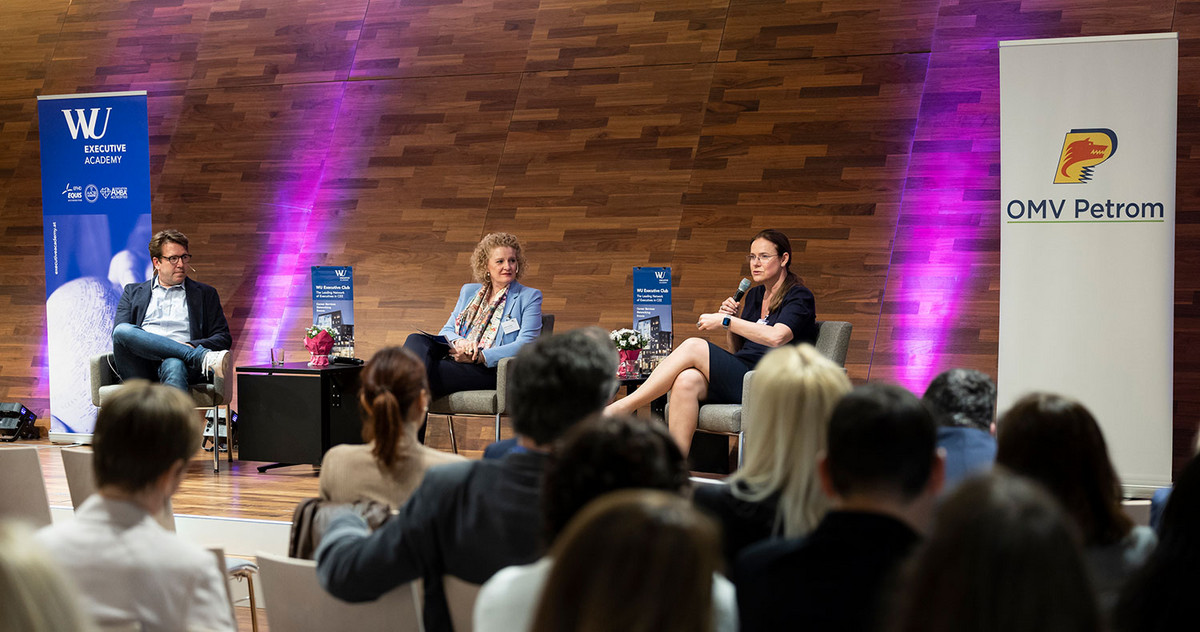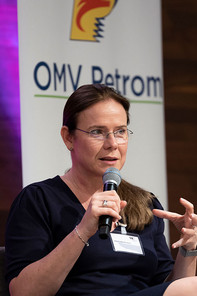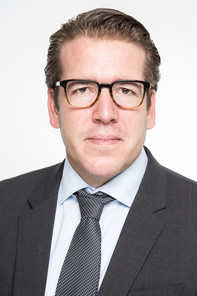Overview
Recommendations
Next Steps
Social media
The Magnificent Transformation of OMV Petrom
On the occasion of the 10/15-year alumni reunion at the WU Executive Academy, Christina Verchere, CEO of OMV Petrom (which is part of the OMV Group) in Romania, joined an expert talk with Jonas Puck, Academic Director of the MBA Energy Management. Based on the self-disruption she witnessed in her company, she outlined how the energy transition could work out, also detailing the role leadership played in this process.

There are currently few industries undergoing as many and as fundamental changes as the energy sector. To celebrate the 10- and 15-year reunion, the WU Executive Academy hosted an event titled “Leadership of the Future: What it Takes for the Energy Transition to Succeed” for MBA students and alumni in one of the Ceremonial Halls of WU’s futuristic Learning Center.
The event’s star was clearly Christina Verchere, the CEO of the largest energy corporation in Southeast Europe. In her keynote, Verchere, who has always worked in the energy sector ever since she joined the workforce 30 years ago, described the efforts undertaken by her company to realize an internal transformation in line with the goals of the energy transition to contribute to the global move away from fossil fuels.
Leadership plays an important role in this process: “Ownership is important if you want to achieve a real transformation. The more you involve employees, the more ownership and commitment to undergo a real transformation you’ll see.”
Her group introduced the so-called Grow Leadership Program, which supports managers throughout the change process. “There’s nothing we have not seen when it comes to red tape. Now we go by the motto ‘Simplify and prioritize’,” Christina Verchere explained. The introduction of digital signatures during the pandemic greatly cut down time and money necessary for certain processes.
When it comes to leadership, she decided to take a new approach. “We have to trust people to make good decisions, boosting both their confidence and ability to make sound judgments. We also expect managers to learn to develop their staff and cooperate with others,” she said.
When things are changing, diversity is another essential component that drives success: “Our management team is made up of two women and three men from overall four different countries. This also makes for diversity of thought.” At the same time, it falls short to reduce diversity to biographies: “We need a real culture of inclusion so that every employee can speak up and share their ideas and opinions.”

Christina Verchere
Team cohesion is also important. A group of people only becomes a community once they have started to think collectively. Work gets a lot of fun then. We all work a lot and it’s important to us to be part of a bigger whole. We win and lose as a team.
In addition to Christina Verchere and Jonas Puck, the Academic Director of the MBA Energy Management, Barbara Stöttinger, Dean of the WU Executive Academy, joined the panel at the event.
Jonas Puck stressed that it was difficult to predict demand and supply in the energy sector: “The entire sector has probably never been shaken the way it is right now,” he said.
Christina Verchere underlined how every single individual had a responsibility to live up to against the backdrop of climate change and the necessary energy transition: “What’s really difficult for everybody is that we all want climate change to stop, but we’re not willing to make changes in our lifestyle. Maybe it’s time to take a closer look at our consumption habits.” She sees a lot of potential in increasing buildings’ energy efficiency. And she also addressed corporate responsibility: “As a company, we know that our products must get cleaner. We have to find new products because a large part of our current portfolio will no longer be in demand 50 years from now,” she said. The group focuses on reducing CO2 emissions caused by its production processes.

There are, however, several sides to this story: “The energy transition is a luxury the West can afford. The per capita income in Romania is among the lowest in Europe; expecting significant changes there would be unreasonable.” Jonas Puck’s research confirms this view: “The rise in consumption is, to a great extent, caused by the emerging economies; at the same time, these countries’ investments in renewables are much smaller,” he explained.
Pricing policy was a delicate topic for Jonas Puck: “It is extremely hard to say whether it is better to have high or low prices,” he said. “When prices are high, energy companies make more profit and are thus more reluctant to adapt their strategic portfolios. Low prices, on the other hand, drive energy consumption. So any kind of regulation implemented for the sake of the energy transition must be considered very carefully,” Jonas Puck says.

Jonas Puck
In my opinion, it’s best to push innovation in the oil and gas industries – there’s so much untapped potential there, for instance regarding more efficient energy storage.
At OMV Petrom, Christina Verchere wants to focus more strongly on clean energies. “Romania gets a lot of sunshine,” she pointed out. She explained that biofuels such as second-generation ethanol were also something to have an eye on. In the field of wind energy, the group has adopted onshore models: “Offshore is simply way too expensive.” She mentioned that CO2 storage was a way to use the company’s expertise: “You need reservoirs to store CO2. There are a ton of those in Romania. And what’s more: we are experts in managing reservoirs.”
Read here which absurdities have to be encountered on the way to energy transition.